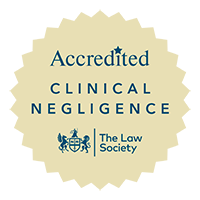Top ranked cerebral palsy claims lawyers
If you are contacted by NHS Resolution after the birth of your child, we advise you to contact us for free, confidential, specialist and independent advice straight away. Your child may be entitled to claim substantial compensation.
NHS Resolution is the NHS’s defence organisation. They defend the NHS in compensation claims when patients have been injured as a result of medical mistakes or negligent care.
When a baby is thought to have suffered a brain injury from lack of oxygen at birth, hospitals are required to notify NHS Resolution. This is known as the Early Notification Scheme or ENS. NHS Resolution then makes contact with the parents to find out more about what happened. This is known as Early Intervention.
Early Notification and Intervention gives the NHS defence team (NHS Resolution):
- earlier information about what happened so that they can investigate maternity mistakes;
- access to the parents’ recollections sooner than they would have by waiting for the parents to make a birth injury compensation claim;
- an opportunity to advise the parents about whether they should claim compensation. This advice is given:
- before the parents have been able to seek independent, legal advice from claimant (injured patients’) specialist solicitors;
- from the NHS defence team’s point of view.
Following ENS and Early Intervention, NHS Resolution may:
- (in some but not all cases) admit that negligent care or maternity mistakes were made;
- (occasionally) admit that negligent maternity care caused the baby’s brain injury;
- offer to make an interim payment (only where both negligence and causation are admitted).
Parents should know that a refusal by NHS Resolution to admit liability (fault) or causation does not mean that their child has no claim. In over 50% of the cases that our cerebral palsy lawyers won or settled for clients last year NHS Resolution initially refused to admit full liability. As specialists in brain injuries to babies, our highly experienced lawyers are skilled at identifying where maternity or neonatal care errors caused or contributed to our client’s injury and proving our client’s right to substantial compensation. Once liability is admitted, we push for immediate, substantial interim payments for our clients, which routinely far exceed the amounts offered by NHS Resolution following ENS.
The ENS scheme only investigates the maternity care given to babies who show signs of possible hypoxic brain damage in the few days immediately after birth. Hypoxia or asphyxia means lack of oxygen. Claims for cerebral palsy most commonly follow brain injury from the baby being allowed to suffer lack of oxygen around the time of birth.
NHS Resolution’s Early Notification Scheme only applies if the newborn baby:
- has a diagnosis of Grade 3 HIE (hypoxic ischaemic encephalopathy);
- needed therapeutic cooling after birth;
- had seizures, coma or floppiness (hypotonia) after birth.
However, many of the brain damaged or neurologically disabled children we help can still claim substantial compensation if their injury was caused from different types of maternity or neonatal mistakes.
Parents have a right to full, open and honest information about their baby’s right to compensation after maternity mistakes lead to serious brain injury. Whilst ENS provides an early means for the NHS to investigate potential claims, in many cases parents of injured babies are not getting the level of advice or financial support for their child’s claim that they deserve. We recommend that any parent going through the ENS process, seeks immediate, claimant (patient) specialist legal advice.
If you have been contacted by NHS Resolution following the birth of your child, and would like to find out more about how we can help, contact us by email at cerebralpalsy@boyesturner.com
They have a great deal of knowledge and expertise, and client care seems to be their top priority.
Chambers Guide to the Legal Profession
Contact our expert Cerebral Palsy solicitors today for support with your claim




